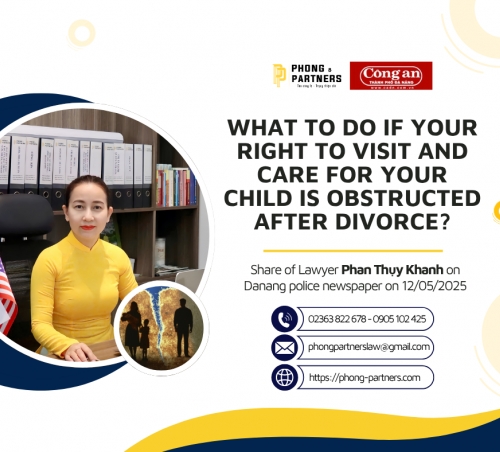*Lawyer Phan Thuy Khanh – Deputy Head of Phong & Partners Law Firm, responds:
In today’s modern society, it is increasingly common - particularly among young people - for couples to choose to live together as husband and wife without registering their marriage, a practice commonly referred to as "cohabitation." This phenomenon stems from various reasons, such as the desire to better understand each other before entering into marriage, or changing perceptions of family life in the context of integration and globalization.
However, the consequences of cohabitation are not limited to emotional aspects but also give rise to numerous legal issues - especially when a "common child" is born from the relationship. When a man refuses to marry or decides to end the relationship, single mothers are often left to bear the responsibility of raising the child alone. This places a significant burden on the mother, particularly during times of financial hardship when support from the other parent is needed.
In such circumstances, understanding the legal provisions on child support is essential to safeguard the lawful rights and interests of the child. Ms. Cuc may refer to the following legal guidance provided by the lawyer.
First, does a parent have a child support obligation toward a common child if there is no marriage registration?
Article 3.24 of the 2014 Law on Marriage and Family defines child support as follows: "Support means an act whereby a person has the obligation to contribute money or other kinds of property to meet the essential needs of another person who does not live together with but has marriage, blood or raising relation with the former and is a minor or an adult who has no working capacity and no property to support himself/herself, or meets with financial difficulties as prescribed by this Law."
Based on the provision above, the obligation of parents to provide support for their common child arises when: (i) they do not directly live with the child; and (ii) a biological or foster relationship between the parent and the child has been established.
Thus, marriage registration between the parents is not a prerequisite for establishing a child support obligation. In Ms. Cuc's case, your ex-boyfriend does not reside with the child but has acknowledged paternity, and there is a DNA test confirming the biological relationship. These are strong legal bases to prove the father-child relationship (blood relation) under Article 14 of Circular No. 04/2020/TT-BTP. Therefore, the child support obligation toward the minor child is established even though the couple did not register their marriage.
Additionally, pursuant to Article 14.1, Article 15, and Article 83.1 of the 2014 Law on Marriage and Family, as the biological mother and current sole caregiver of the child, Ms. Cuc is fully entitled to request that the child’s father fulfill his legal obligation to provide support to ensure the child’s upbringing, education, and comprehensive development.
Ms. Cuc and your ex-boyfriend may mutually negotiate and agree on an appropriate support amount, including expenses for the child’s upbringing and education. If they are unable to reach an agreement, the court will determine the level of support based on the father’s actual income and financial capacity as well as the child’s essential needs. However, this amount must not be lower than half of the monthly regional minimum wage applicable at the place where the father resides, per month per child (as stipulated in Article 7.2 of Resolution No. 01/2024/NQ-HDTP).
Second, the starting point of a parent’s child support obligation toward their common child
Pursuant to Articles 82, 83, 107, and 110 of the 2014 Law on Marriage and Family, and Article 7.4 of Resolution No. 01/2024/NQ-HDTP, the obligation of a parent to provide support for a minor child arises from the time the parent no longer lives with the child and lasts until the child reaches adulthood (i.e., 18 years old). If the obligated party fails to fulfill this obligation, the person directly raising the child has the right to request the obligated party to reimburse a portion of the child-rearing costs incurred during the period when the obligation existed but was not fulfilled. (See Precedent No. 62/2023/AL on the starting point of the child support obligation in disputes involving paternity determination). This legal framework serves both to ensure fairness for the parent bearing the direct burden of child care, and to better protect the lawful rights and interests of the child—a vulnerable group that must be given priority under the law.
According to the information provided, Ms. Cuc has been solely responsible for caring for, raising, and covering all expenses related to the child since birth. Therefore, her ex-boyfriend’s obligation to pay child support began from that point in time.However, as of now, he has not fulfilled this obligation. Accordingly, Ms. Cuc has full legal grounds to request that he reimburse a portion of the child-rearing costs incurred during the previous period when the obligation was in effect but not performed, and continue to fulfill his child support obligation until the child reaches adulthood.
Third, what are the legal consequences for failing to fulfill child support obligations for a common child?
If Ms. Cuc’s ex-boyfriend intentionally fails to fulfill his child support obligations, depending on the nature and severity of his conduct, he may be subject to administrative sanctions or even criminal liability. Specifically:
According to Article 21 of Decree No. 130/2021/ND-CP on administrative penalties in the field of social assistance and child protection, a violation of child support obligations may result in an administrative fine of up to VND 15 million.
"Article 21. Violation of regulations on caring and nuturing children
1. A fine ranging from VND 10.000.000 to VND 15.000.000 shall be imposed on:
a) Either parent or caregiver of children who fails to fulfill their obligations and responsibilities in caring, nurturing children except for cases where such individuals must be isolated from the children or the children are under adoption as per the law;
b) Either parent or caregiver of children who fails to care, nurture the children, neglect their obligations and responsibilities in caring, nurturing children or abandoning children or severing emotional and financial support for children or forcing children to live away from the family, except for cases where either parent or caregiver must temporarily be isolated from the children or the children are under adoption as per the law."
In addition, pursuant to Article 186 of the 2015 Criminal Code, as amended in 2017, a parent who refuses or evades their child support obligations in a manner that endangers the life or health of the child may be subject to criminal liability and face a prison sentence of up to 2 years.
"Article 186. Denial or avoidance of obligation to provide support
If a person who has an obligation to provide support and is capable of providing support for another person for whom the former is responsible for providing support as prescribed by law denies or avoids such obligation and such denial or avoidance results in serious bodily harm of the recipient or does it while having incurred an administrative penalty for any of the offences specified in this Article, except in the circumstances specified in Article 380 hereof, the offender shall receive a warning, face a penalty of up to 02 year's community sentence or 03 - 24 months' imprisonment."
The fact that the law imposes strict sanctions on individuals who evade child support obligations reflects that this issue extends beyond moral and parental conscience—it is also a matter of legal responsibility. It represents not only a duty between individuals but also a responsibility toward the state and society as a whole. Therefore, parents—especially those who are directly raising the child—should proactively seek to understand and assert both their own legal rights and those of their child. This ensures that they can timely request the necessary support to provide the child with a stable life and the best conditions for growth and development.















